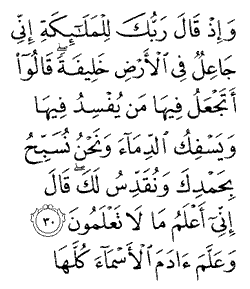Living The Quran
From Issue: 935 [Read full issue]
Conditional Trust
Al-Baqara (The Cow) Sura 2: Verses 30-31 (partial)
 "And when your Lord said to the angels: 'I will create a vicegerent on earth', they said: 'Will You place therein one who will spread corruption and shed blood, whilst we hymn Your praise and glorify Your holy (name)?' God answered: 'I know that which you know not.' And He taught Adam the names of all things."
"And when your Lord said to the angels: 'I will create a vicegerent on earth', they said: 'Will You place therein one who will spread corruption and shed blood, whilst we hymn Your praise and glorify Your holy (name)?' God answered: 'I know that which you know not.' And He taught Adam the names of all things."
God introduces humanity as khalifa. This is a central concept of Islam. The word is often translated, as 'vicegerent', but it also has the sense and can be translated as 'trustee'. Khalifa includes the notion of succession, of one who succeeds another, or inherits. What we inherit is our place in God's created order. Our inheritance is not outright ownership but a conditional trust: we have to discharge our trust responsibly with accountability to God. We will each have to answer for how we used this inheritance. We must answer for our own actions; we must answer for how we operated our relationships with our fellow human beings; we must answer for how we cared for and utilised the resources of the world in which we live. And, as the term implies, we live as part of succeeding generations of human beings and thus have responsibilities towards future generations. We are responsible for handing on the trust of this world in as good a state as possible for the use and benefit of those who come after us.
To be human is to have abilities: this is symbolised in God teaching Adam the 'names of all things'. The word for names (ism) is understood to mean the ability to define and distinguish between things, the essence of reasoning and conceptual thought. We are created with the capacity to be knowledgeable beings with the ability to learn. Learning and knowledge are by their very nature cumulative, so we have the potential as well as the responsibility to progress in understanding. To know the names is the basis of language. As the Quran makes clear (30:22, 49:13), the diversity of human languages, cultures and races and nations is part of the intention of creation. Therefore, whatever the language or cultures of our birth, the challenge is to employ these endowments, to use our abilities to make the best of our life on earth.
Compiled From:
"Reading the Qur'an: The Contemporary Relevance of the Sacred Text of Islam" - Ziauddin Sardar, pp. 91, 92